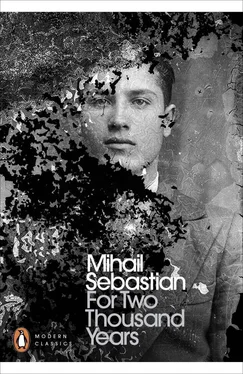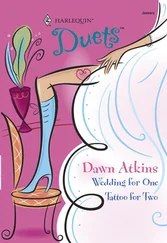‘Then it’s Talmudism, if you wish. But listen to me in any case. And, so as not to generalize, let’s take a concrete example. A moment ago you said there were one million eight hundred thousand Jews in Romania. Where did you get that figure from?’
‘Where did I get it from? I know it. It’s common knowledge.’
‘“Common knowledge” is rather vague. How was it arrived at? Who arrived at it? Who verified it? Nobody, obviously. According to the Jews themselves, there are calculated to be between eight hundred and nine hundred thousand. At most, a million. According to authorities, in taxation, local government, electoral registers — there are slightly more than a million: a few tens of thousands more. But you bluntly say, simplifying the controversy, a million eight hundred thousand. Why? Is it not perhaps because this extra seven or eight hundred thousand satisfies your anti-Semitic feelings, which precede any figure and any danger?’
‘It’s wrong of you to abuse the argument in this way. I don’t of course have the means to determine how many Jews there are. Let’s say there are only a million. So what? Do you think if there’s a million, they no longer constitute a threat?’
‘You see, dear master, now it’s your turn to be crafty. Because that’s not the issue. It’s not about how many of them there are, but how many of them you think there are. Why do you — so critical in architecture and so rigorous about every fact and affirmation, so severe in your own thinking and conscience when it concerns artistic matters — why do you become suddenly negligent and hasty when you start to speak about Jews, casually accepting a ninety per cent approximation, when in any other domain you’d baulk at an approximation of 0.01? Why does your intellectual probity, which I have so often judged to be too exacting when you foolhardily stake everything you have for the tiniest truth — why does this probity no longer apply here, in our conversation about Jews?’
He said nothing for several moments. He stood up, took several steps across the terrace, stopped before me, perhaps wanted to say something, thought better of it, and then continued pacing the terrace, steadily, lost in thought. Then he spoke, very calmly, without the usual abruptness to his statements.
‘You were right just now. It’s very hard for us to see eye to eye. Every fact and argument can be construed and misconstrued in a thousand ways. It’ll never end.’
‘Well, if you reject metaphysical explanations …’
‘No, be serious. The truth is, we’re not statisticians. If we were, it would be as easy as pie. We’d say: there are so many Romanians and so many Jews. So many good Jews and so many Jews who constitute a threat. And we’d be completely enlightened. But as we can neither count them nor judge them, we have to be satisfied with certain impressions, certain intuitions. I know, for instance, that there are two Jewish bankers in Romania who manipulate our politicians, our government, our apparatus of state. Well, I have the feeling that these two examples represent an entire intolerant and domineering Jewish mentality. You want me to give you figures, when it’s a matter of intuition? Who are we? People who enumerate or people who think?’
‘Neither, in this case. We’re people who feel. You said it yourself: “I have the feeling that …” Well, we’re in agreement here. It’s a matter of a feeling, not of reason. That’s why the discussion seems superfluous to me. Bear in mind that I tried to avoid it. But I was accused of dealing in metaphysics. I’m so convinced that this feeling of yours, this “intuition” if you prefer, is unassailable, that I know in advance that every argument, good or bad, will fail. I could contrast those two Jewish bankers you spoke of with two thousand or two hundred thousand unfortunate miserable Jewish workers struggling against hunger to earn their daily bread. But what of it? Would this shake your faith in your intuitions? God forbid! Do you not see that what you call “intuition” and what I call your “anti-Semitism” select examples that can nourish it and ignore those which can refute it?
‘There has always been something in the Romanian sensibility which has driven it to count the deserters and to disregard the dead and wounded. Out of bad faith? No. I’m convinced that that’s not it. From suspicion and doubt, from being accustomed to dealing with an old feeling of repulsion in others.
‘Believe me, I’m not blaming you for anything. I tell you this with my hand on my heart: There’s an inevitability to this against which there is nothing to be done. As it happens, your arguments are unjust. Even if they were excellent, we would still get nowhere. I believe, with great regret and equanimity, that there’s nothing to be done about any of this. That with all the goodwill in the world, on both our parts, it’s a lost cause from the start. I feel awkward talking this way about myself but, having arrived at this point, it’s best to speak unreservedly. You know, I’m certain that some day, if necessary, I’ll die on a Romanian front line. Heroism? Certainly not. But I don’t believe I’m a shirker. I’m not the kind to run from a place where something decisive is being played out. I believe that wherever I find myself, in life, in war, in love, I will stay and fulfil my destiny. Our many years of friendship and acquaintance permit me to tell you this simply. Well, do you think this last hour is going to prove anything? Because, one way or another, won’t I always be an outsider, always under suspicion, always kept at arm’s length?
‘No, no, believe me, it’s all useless. And, anyway, my sense of this futility is also my only consolation.’
Again he was silent, for a long time, thinking. I couldn’t tell if he had been able to follow all I had said or had absently continued his own line of thought. Then he addressed me, with a certain weariness.
‘You dispirit me. I don’t know why, but I have the impression that every door you close opens ten more. Certainly, I’d find it difficult to reply to you. We would move still further from the heart of the matter. The heart of the drama, if you like, if that pleases you. You’re far too passionately Jewish and I’m far too self-restrainedly Romanian for us to agree. In argument, of course, as elsewhere in life, permit me to be less sombre than you are and to say that with Jews like you peace will always be possible. Even more than peace: love.’
‘“With Jews like you …” I’ve heard this expression before. “If only all Jews were like you …” It’s a familiar old way of being friendly. And so humiliating. I’m tired of it, believe me.’
‘Tired and intolerant. You don’t let me finish, you don’t let me explain myself. You’ll admit you’re a difficult person to converse with. I firmly believe that your “metaphysical” despair introduces too much complexity into what is a difficult practical problem, but one to which a solution exists. The fact that I believe this is the beginning of the solution. It remains for you to believe it too — all of you — and the job is done.’
‘You have a naive spirit.’
‘Yours is tragic.’
We both lit our cigarettes. We tried to talk, but it didn’t work — and it was late when we separated, a little embarrassed, with a truly warm handshake.
Ştefan D. Pârlea’s conference at the Foundation on the values of gold and the values of blood. An enormous crowd, on the balconies, on the stairs, on the steps to the stage. Pârlea had to struggle to the lectern. He was pale and resolute, as though bearing the burden of the masses, though at moments his gestures assumed such violence and directness that he seemed to hold everybody’s breath suspended in expectation with his upraised arm.
Читать дальше












